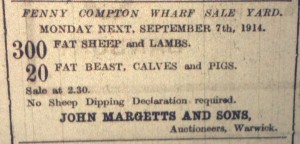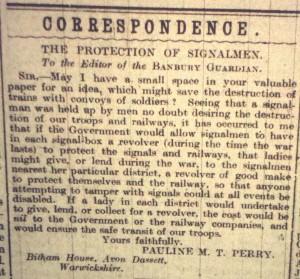Banbury Guardian, September 1914
Category Archives: Timeline
Mollington – The War
Special services of prayer on behalf of the soldiers engaged in the war were held in this parish on Friday, August 21st at 11 am and 6 pm. A committee of ladies has been formed under the presidency of Mrs. Purdue for making garments for the soldiers. A house-to-house collection was made by Miss Purdue and Mrs. Aubrey Boddington, and the appeal was generously responded to, the amount realised being £5 12 s. 7d., with the prospect of a few more contributions. The collections at the harvest festival, on September 27th, will be equally divided between the Banbury Hospital and the Prince of Wales Patriotic Fund. Harvest operations are well advanced owing to the continuance of the fine weather.
Banbury Guardian, September 1914
The Municipal Elections
No Postponement Bill to be Introduced
In the opinion of the Government there need be no postponement of this year’s municipal elections on account of the international crisis. Replying in the House of Commons to Mr Sherwell (Huddersfield), Mr Herbert Samuel (President of the Local Government Board) said the Government had considered the question of introducing a bill for such a postponement, and they had decided that there was not sufficient reason for such legislation. Local arrangements could be made by agreement for the avoidance of party contests, and the House would no doubt agree that in the present circumstances such arrangements should, if possible, be made.
Banbury Guardian, September 1914
Warwickshire Relief – Over £10,000 Promised
Lord Algernon Percy presided at a meeting of the Warwickshire War Relief Committee held at the Shire Hall, Warwick, on Thursday. There was a good attendance, including the Countess of Denbigh, Lord Leigh, Lady Ilkeston, and Sir Michael Lakin.
The honorary treasurer reported that £10,197 had been promised to the county relief fund in support of the National Fund, and £7,975 had been actually received. £250 of this for special purposes in Warwickshire. It was decided to send £7,725 to the Prince of Wales’ Fund as a first instalment.
It was decided to write to the honorary secretaries of all the local committees urging that all possible steps should be taken to collect for the fund, and it was also resolved that local committees should apply to the county committee for funds for the relief of distress.
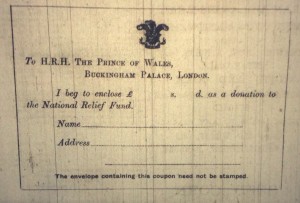
Banbury Guardian, September 1914
Grand Theatre – The British Army and its Work
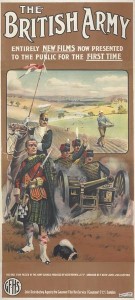
Militarism is in the air, and it entirely filled the programme at this theatre during the first three evening of this week. Pathé’s Gazette dealt with naval and military subjects in a vivid manner, and was greatly appreciated by a large audience. A six thousand feet film, “The British Army,” was the leading feature, and a remarkably interesting one it was. The picture ran for two hours, and our brave defenders were shown in all the varied aspects of military life from the raw recruit, to the intelligent and highly equipped soldier. A part of the film had been taken at Aldershot by the authority of the Army Council. The mechanism of quick-firing guns was shown, as was a ceremonial parade of the Royal Artillery, and the same regiment in action. Aeroplanes were to be seen working over the troops, brilliant cavalry charges were thrown on the screen, and warfare was exhibited in its many phases. The pictures were all through an excellent series, and were highly instructive, as well as conveying much that was interesting. The exhibition of the film was most opportune, and the management showed much foresight in securing it. The audience on Monday night gave it the heartiest of receptions. It is a Gaumont film and did the firm every credit. For the remainder of the week there will be a military spirit in the programme, for “Twixt War and the Girl” heads the bill, a thrilling three thousand feet film.
How to be useful in War Time
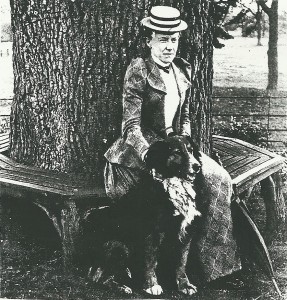
Miss Perry, Bitham House, Avon Dassett, writes: Seeing the serious attack on the signalman at Northchurch, it has occurred to me that, if the Government would allow it, ladies might give or lend during the period of the war, to the signalman nearest to their particular district, a revolver (of good make) for use in such a case.
The Times, 2 September 1914
Banbury Guardian, 17 September 1914
It’s a Long Way to Tipperary
Special Intercessions and Generous Contributions
It has been impossible looking across our lovely country in all its August glory – and glorious indeed it is this year, not a sea of mud, as two years ago, or a desert of dust as in 1911, but green and gold, bright in the sunshine, the harvest teams carrying the well-got crops to the stack – it has been impossible to realise that not two hundred miles from our coast, the biggest war in history is in progress, and that Britain is one of the combatants. At noontide the harvest field presents the usual scene of industry, without any apparent diminution, and we should forget, if such a thing were possible, the task to which Britain had put her hand, until from the grey old church tower, rising from the cluster of trees, among whose greenery brown patches of stone and thatch marks the village homes, comes a few strokes of the church bell. It is the “Peace bell” which has been adopted in many of our rural parishes, and rings at noon to remind the workers and others who enjoy the blessings of peace in the midst of war of the need of their prayers for those fighting that peace may be preserved.
If we enter the harvest field we are not greatly struck by any difference to other years. There are apparent here and there a volunteer or two. In one Oxfordshire village, the schoolmaster was seen hard at work, enjoying his holiday in helping to carry his neighbour’s corn, and in others grooms and gardeners have turned out to take the places of men who have been called out on military service. There are very few of our villages that have not furnished their quota, but in no case has it been sufficient to interfere with the general work of the harvest, although an individual farmer may have been hit rather hard, in which case his friends and neighbours, as above, show an admirable spirit of help. It is similarly so with the horses. In almost all villages, the remount officers have been and drawn what they have required. In some cases a certain amount of inconvenience has been reported, but the class of horse usually required for agricultural purposes has not been required, and the sales made have generally been at satisfactory prices to the sellers. An inquiry in the local villages does not confirm the rumours heard a week or two ago of local tradesmen and farmers being crippled by the loss of horses. That these were not confined to our locality is shown by the statement which the Board of Agriculture has thought it desirable to issue, which shows that only slightly over one per cent of the total heavy draught horses used for agriculture have been taken by the military authorities. Obviously there is a sufficiency of horses for military purposes without interfering with agriculture. Such a conclusion is borne out by our local inquiries. In Banbury and Bloxham Petty Sessional Division the number of horses returned in the Board of Agriculture statistics for 1913 was 2,389; in the Brailes district, 1,450; Kineton, 1,616; Brackley, 2,841.
While dealing with the question of horse supply, we might draw attention to official notice which appear in our advertising columns from the remount authorities for this district, giving the names of the gentlemen authorised to purchase the county. Local farmers and tradesmen should see therein named.
Leaving the fields and entering the villages, at the present moment we see a wonderful spirit prevailing, and the reports printed below show that this spirit is general. The heart of the country is thoroughly sound, and one thinks that it is probably so throughout the whole of the kingdom one realises the tremendous moral force created by the war.
As one enters a village at the present moment, one is met by a great anxiety to know the latest news, meagre as it has been up to now, and one is conscious of a barely concealed excitement, especially among the older people who are more oppressed than the young by the dreadful suspense which accompanies waiting for tidings fraught with so much. One thing that strikes one, as you look round the village and inquire what is being done, and that is the wonderful unanimity which this miserable war has produced. It is not only at Westminster that ranks have been closed. In the least-known village the spirit prevails. Religion, politics, local petty and personal jealousies, which in normal times divide up even the smallest village communities, have disappeared and a wonderful industry has taken the place of contemplating their neighbours’ differences from themselves. In all the villages the women have set themselves hard at work making garments destined for the fighting line, or the sick and wounded, and this in a spirit of concord and common interest for their dear country’s sake which has revealed a feeling too little seen in village life. It has been quite touching to see some of the very old doing beautiful work, even at hard labour to themselves. There is a true love breathed in our village labours today, and it has burst through the rubbish which for so many years has obscured it. In the Te Deum which in God’s good time we hope to sing, let us not forget this revelation as one of the blessings for which we return thanks.
The hunger scare which beset the country as well as the town has subsided during the past fortnight. Instances have been reported to us of those with the means laying up food for months ahead, and also of village tradesmen charging the villagers a higher price for foodstuffs. A look round the fields, rickyards, gardens and pigstyes tends to convince us that there is foodstuffs in the country for many months to come. A well-known agriculturalist of prudent mind, however, remarked to us that the more thoughtful were wondering what it would be like when the east wind blows at Lady Day, and said that the best advice he could give us was, “Trust in God and waste nothing,” a motto for the moment from the country which deserves to be given as wide a circulation as the “Business as usual,” which is resounding from the towns. Another farmer told us that the price of many articles of consumption has been met to a great extent by the increased wages paid during harvest, and he also informed us – and we were grateful to hear it – that an excellent good feeling is existing between employers and employed.
Turning to the harvest itself we have much to be thankful for. In the first place the glorious harvest weather bestowed by a bountiful Providence, which enables us to gather well the fruits of the earth at a time when they are of exceptional importance. In many places the crops are cut and safely in the rick, dry, and ready for use another day. The crop itself is a good one, on the whole quite up to the average, and comparing favourably with any we have had since 1908. Wheat is over the average and barley a full average. Oats and beans vary considerably, and the former have been stated as under average in Oxfordshire, while an agriculturalist on the Warwickshire side said there were some considerable good prices, and he did not think they were the minority. The spring sown crop in many cases is almost a failure, while winter oats and winter beans are unusually good. In Banbury market on Thursday the official average for wheat was 35s 5½d per quarter against 45s 6½d a fortnight ago. Cattle and sheep are now selling at satisfactory prices to the stock-breeder, the sheep being particularly dear.
On the question of military service our inquiries have shown, as stated above, that there are few of our local villages which have not furnished men for service. On the other hand recruiting does not seem to have been brisk in many of the agricultural villages. This may be explained by the fact that few eligible young men now remain in their native place to find employment in agriculture, and also there is not in the village the same impetus that is found in the town where the young man has his patriotism excited to action by the examples of his comrades and fellow workmen.
Finally, there is the deeper aspect of the national crisis. There is no doubt that it has produced a religious spirit among all classes of the people, and this is quite as perceptible in the villages as in the towns. In churches and chapels throughout the district special services of intercession are held and are well attended. That such large congregations have been secured in the middle of harvest as have been seen at some of the village services evidences the quality of the spirit in which the situation is faced. The generosity shown to the collections is very striking. The country people are giving liberally if their means, and many of the collections would do credit to a larger place. In nearly all the villages intercession services are being held daily or weekly.
Banbury Guardian, August 1914
Obituary of Susan Ellen White
Avon Dassett
Obituary – we regret to announce the death of Mrs. Susan Ellen White, wife of Mr J. H. White, the assistant overseer for Bishop’s Itchington. The deceased lady, who came of an old Avon Dassett family [Gardner], had been ailing for some considerable time from an affection of the heart. About a fortnight ago she became worse, and she passed away on Saturday evening last at the age of sixty-two. She leaves a husband and five sons and five daughters to mourn her loss. The funeral took place on Thursday, the Rev. G. A. Irving officiating.
Banbury Guardian, August 1914
Masters of Foxhounds Association and the War
At a meeting of the Committee of the Masters of Foxhounds Association held at Tattersall’s for the purpose of considering the possibility and advisability of hunting this coming season, there were present the Duke of Beaufort, Lord Leconfield, Mr G. W. Fitzwilliam, Mr J. C. Straker, Mr E. Curre, Mr W. H. Wharton, and the Hon. Secretary, Mr. J. R. Rawlence. The following resolution was passed unanimously:
While recognising the fact that, under the present circumstances, regular hunting will be impossible, the Committee of the Masters of Foxhounds Association consider that it would be most prejudicial to the country in general if it were to lapse altogether. They would therefore recommend that cub hunting should take place, and continue as long as possible, in order to kill as many foxes as possible in the various countries and enter the young hounds, but that hunting should not be looked upon from a sporting point of view until the war is over. Where it is not possible to hunt the full number of days, the committee strongly recommend masters of hounds to take measures to reduce the number of foxes in proportion to the amount of hunting days they think they will be able to manage. They would also urge that people having the interests of hunting at heart should continue to subscribe, as far as their means permit, to the various packs, as otherwise a very serious state of things may arise. The committee ask the general public to recognise that this partial suspension of hunting is in a great measure caused by the fact that the horses of the various hunting establishments have been freely and willingly handed over to the service of the country.
Banbury Guardian, August 1914
